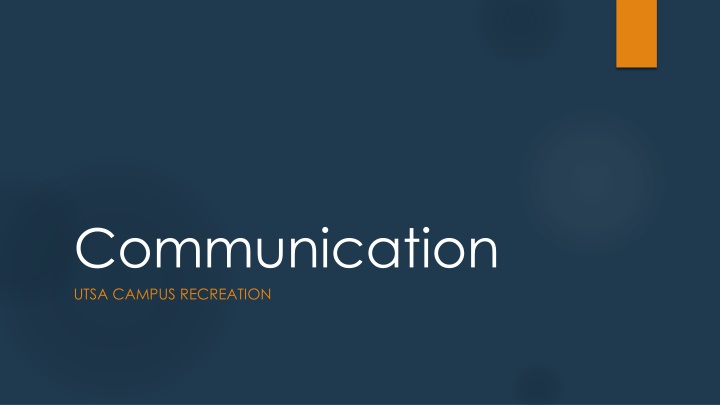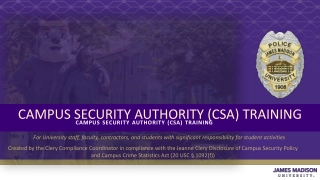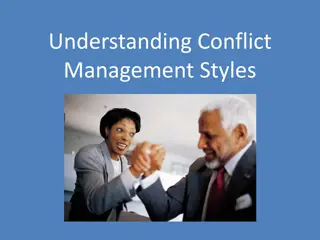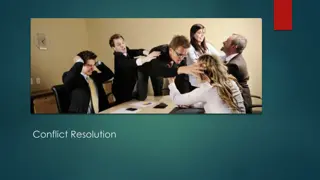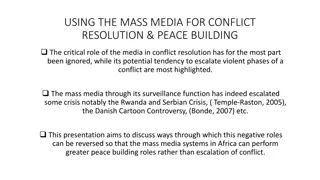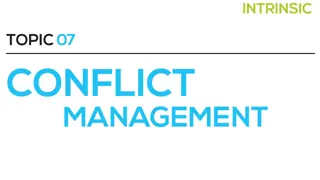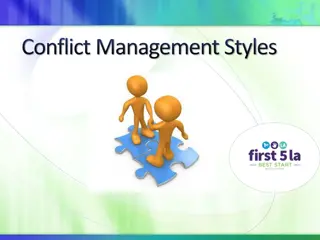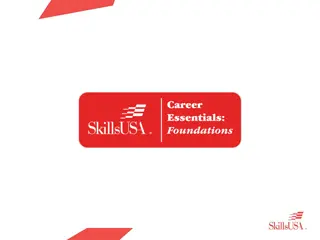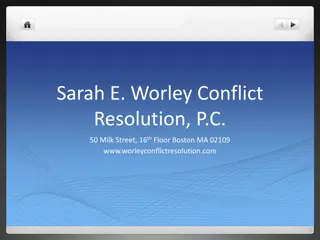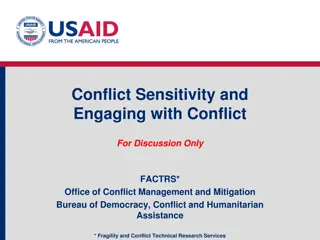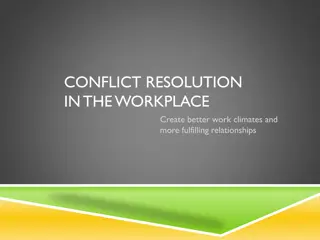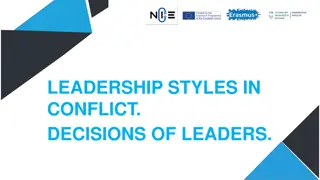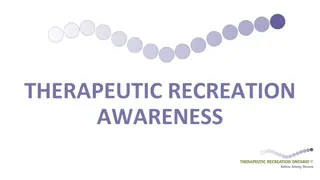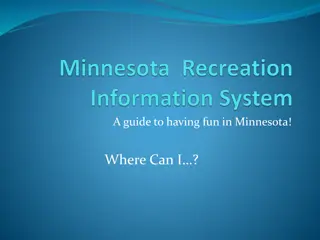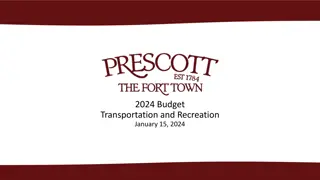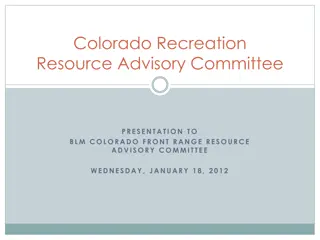Conflict Resolution Strategies in Campus Recreation
Explore conflict resolution techniques in a campus recreation setting, including the Thomas-Kilman model which focuses on assertiveness and cooperativeness. Learn about different styles such as avoiding, accommodating, competing, and compromising to manage team conflicts effectively and maintain a harmonious environment.
Download Presentation

Please find below an Image/Link to download the presentation.
The content on the website is provided AS IS for your information and personal use only. It may not be sold, licensed, or shared on other websites without obtaining consent from the author.If you encounter any issues during the download, it is possible that the publisher has removed the file from their server.
You are allowed to download the files provided on this website for personal or commercial use, subject to the condition that they are used lawfully. All files are the property of their respective owners.
The content on the website is provided AS IS for your information and personal use only. It may not be sold, licensed, or shared on other websites without obtaining consent from the author.
E N D
Presentation Transcript
Communication UTSA CAMPUS RECREATION
Outline What we will cover Conflict Resolution/ Managing Team Conflict Thomas Kilman Model Cooperation in Campus Rec Job Expectations Ask for Help Customer Service Dealing with upset patrons Scenarios
Conflict Resolution & Managing Team Conflict The Thomas Kilman model identifies two dimensions when choosing a course of action in a conflict situation, these are assertiveness and cooperativeness. Assertiveness is the degree to which you try to satisfy your own needs. Cooperativeness is the degree to which you try to satisfy the other person's concerns.
Conflict Resolution & Managing Team Conflict cont d . . . Avoiding You prefer not to face stressful situations. (please allow a few seconds for the video to fully load and then click the play button) This style is best used when dealing with emotionally charged situations. Ex. Dealing with team member who is clearly upset and being irrational in the moment.
Conflict Resolution & Managing Team Conflict cont d . . . Accommodating Beneficial to preserve the harmony. (please allow a few seconds for the video to fully load and then click the play button) This style is best used when preserving a relationship is more important than winning the issue at hand. (Ex. Giving a patron a different towel if they perceive the towel they were given is dirty.)
Conflict Resolution & Managing Team Conflict cont d . . . Competing You only aim to pursue your own goal. (please allow a few seconds for the video to fully load and then click the play button) This style is best used when have greater expertise/better information or outcome is critical and right decision may be unpopular. (Ex. A team member lets a non-approved patron into the Rec. The Supervisor uses their authority to write up team for not adhering to our policy.
Conflict Resolution & Managing Team Conflict cont d . . . Compromising Finding a solution that partially satisfies both individuals. (please allow a few seconds for the video to fully load and then click the play button) This style is best used when each team member is willing to give up something or meeting everyone s needs may not be realistic. (Ex. Supervisor schedules all team members to work one weekend so not only one person is working every weekend. )
Conflict Resolution & Managing Team Conflict cont d . . . Collaborating You are willing to understand the other person s POV and come to a mutual decision. (please allow a few seconds for the video to fully load and then click the play button) This style is best used when there s sufficient time to engage and look at solutions from different perspectives. (Ex. Supervisor works with team member to get their last 30mins covered on Wednesdays so they can attend a weekly SI session.)
Cooperation in Campus Rec Campus Recreation has updated and modified our policies, guidelines, and safety protocols in accordance with the University. These changes will ensure that we are following the most current information for the safety of patrons and staff. It is important that we are all working cohesively and on the same page. The Campus Recreation Professional Staff has created a re-opening plan that will help us navigate through our different phases of opening. For us to be successful, we must all be flexible and willing to adapt. We are all in this together. If for any reason you have concerns or need additional training, ASK FOR HELP!
Cooperation in Campus Rec Be ready for Updated area-specific training Mandated University Student & Staff training Additional Safety protocols Learning new skills/ cross-training Helping patrons understand new University guidelines
Dont Struggle in Silence (Ask for Help) Our purpose is to enrich personal well-being. This not only means our patrons and guests, but for our staff as well. Your well-being is of utmost important to the Professional Staff at Campus Recreation. We want you to know that we care and want the best for each one of our staff members. We want to encourage our staff members to take ownership of their well-being. This not only includes your physical health but for all the 8 dimensions of Well-Being (Emotional, Spiritual, Intellectual, Physical, Environmental, Financial, Occupational, and Social).
Dont Struggle in Silence (Ask for Help) If you need help UTSA Counseling & Mental Health Services Phone or video conference call (210) 258-4140 Conversation with Supervisor Review trainings Discuss concerns Other resources Family Friend Co-worker Spiritual leader
Customer Service Now more than ever, we must communicate with our patrons, visitors, and guests. It is our responsibility that we uphold our policies, protocols, and University guidelines for the safety our patrons and for ourselves. In doing so, we must remember to be friendly, approachable, kind, and understanding.
Customer Service Follow these tips when dealing with upset patrons. Always be professional, positive, and respectful Approach in a friendly manner Remain neutral and don t take it personal Listen without interrupting Collect details by taking notes when they speak Apologize appropriately Confirm their concerns and repeat back Offer choices on how to resolve the situation
Customer Service Read the scenario and answer the multiple choice.
Customer Service Scenario #1 A patrons is working out with headphones in and does not hear that we are closing in 5 minutes. They are currently in the middle of a set using the squat rack. You should: Try and yell at the patron that we are closing and they need to leave. Tap them on the shoulder and tell them to rack the weigh and leave. Start taking the weigh off the bar and tell them they cannot finish. Politely get their attention and inform them we are closing shortly. A. B. C. D.
Customer Service Correct Answer is D. When addressing a patron who is actively working out we want to make sure the patron is safe and not distracted while holding weight. When it is safe for both the patron and our staff, get the attention of the patron and inform them the Rec is getting ready to close.
Customer Service Scenario #2 A patron comes to you and says they have lost their UTSA ID while at the Rec. They have already looked everywhere they have been and still could not find their ID. You should tell the patron: To check in lost and found at the Member Services desk and let the patron know they can also get a new ID on-campus at the Campus Services office. Maybe you should have watched it more closely. I have not seen an ID. Sorry about that. Go check again, maybe you missed a spot. A. B. C. D.
Customer Service Correct Answer is A. It is important that we do our best to help all our patrons. Losing your UTSA ID card can be stressful. Letting our patrons know about Lost and Found and assuring them that they can get another card can help de- stress the situation.
Customer Service Scenario #3 An upset patron comes up to you to complain. They tell you that there are too many people who are not wearing masks. You should tell the patron: Sorry, what do you want me to do about it? I understand that you are upset and may feel uneasy about patrons not wearing masks. The University guidelines for our facility is that masks are strongly recommended but not required. You may be better accommodated during our non-peak hours when less patrons are using the facility. Campus Recreation also does multiple sanitations of our facility throughout the day. Just try not to stand next to patrons who are not wearing a mask. A. B. C.
Customer Service Correct Answer is B. When patrons are upset it is important to listen and acknowledge that you are listening, without interrupting them. Most of the times patrons just want to feel like they have been heard. Collect as many details as you can and repeat back what they said. If possible, offer choices to resolve the situation.
Customer Service The University has recommended using this method to encourage patrons to adhere to wearing face coverings on campus.
